
How to Kickstart Your Career in Tech as an Engineer
Entering the tech industry as an engineer is a promising career path filled with innovation, problem-solving, and the potential for significant impact. However, the journey to becoming a tech engineer can seem daunting, with various specialisations to choose from, each with its unique challenges and benefits. My hope is that this guide will help you navigate the steps to begin your career in tech and understand its pros and cons.
Self-Assessment and Interest Identification
Before diving into the specifics of different engineering roles, it’s crucial to conduct a self-assessment to understand your strengths, interests, and career aspirations. Ask yourself the following questions:
- What subjects or activities excite you the most?
- Do you prefer working with hardware or software?
- Are you more interested in designing systems or solving technical problems?
Tools for Self-Assessment
Myers-Briggs Type Indicator (MBTI)
If you are new to the Personality type, our article on Myers-Briggs Type Indicator might help shed some light on why it is so useful.
Strong Interest Inventory
The Strong Interest Inventory (SII) is a powerful tool to match your interests with potential career paths. It assesses your preferences across various activities, occupations, and subjects to help identify careers likely to satisfy you.
Example:
Imagine you take the Strong Interest Inventory, and the results indicate a strong preference for analytical thinking, problem-solving, and working with data. These interests align closely with several engineering disciplines. Here’s how the SII might guide you:
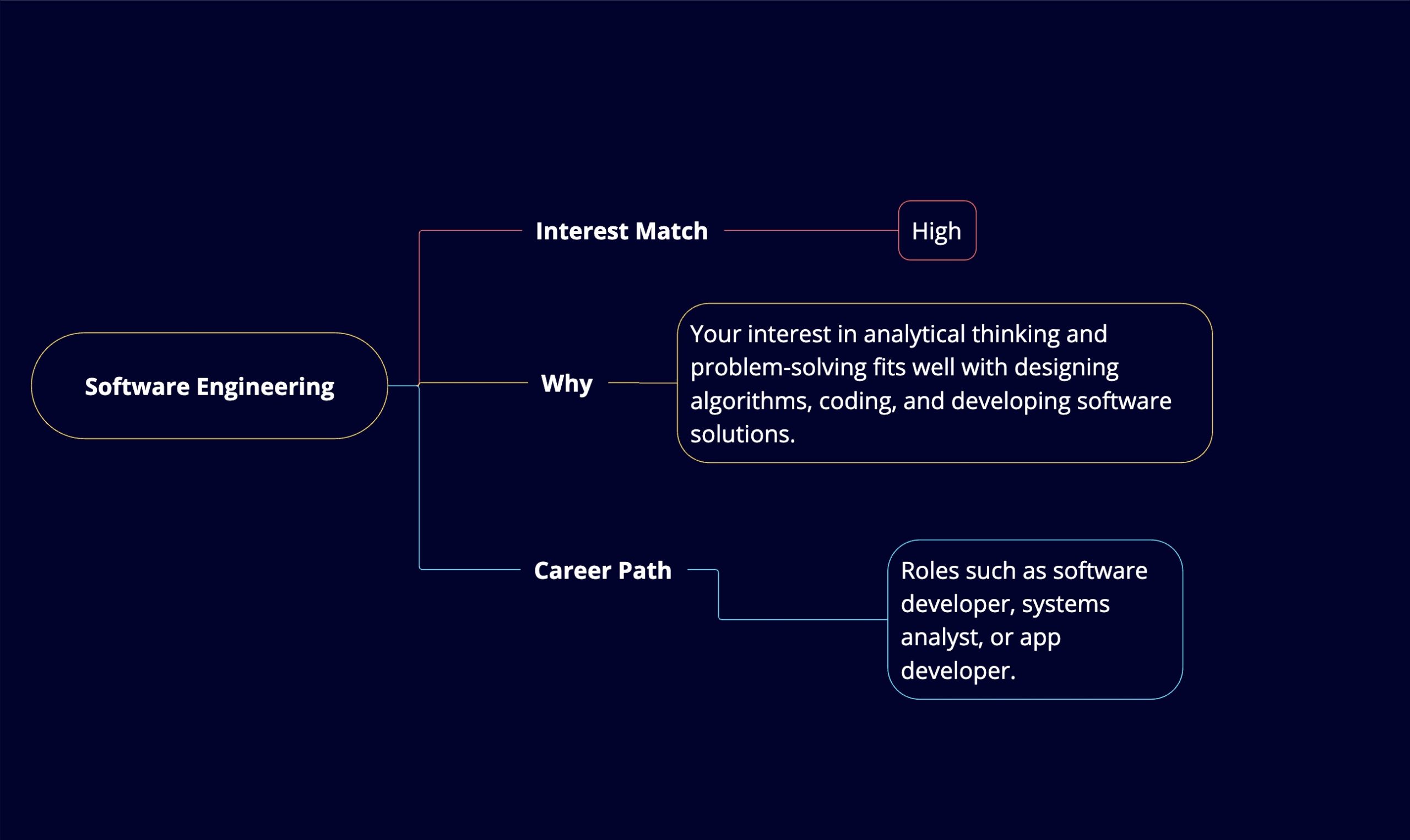
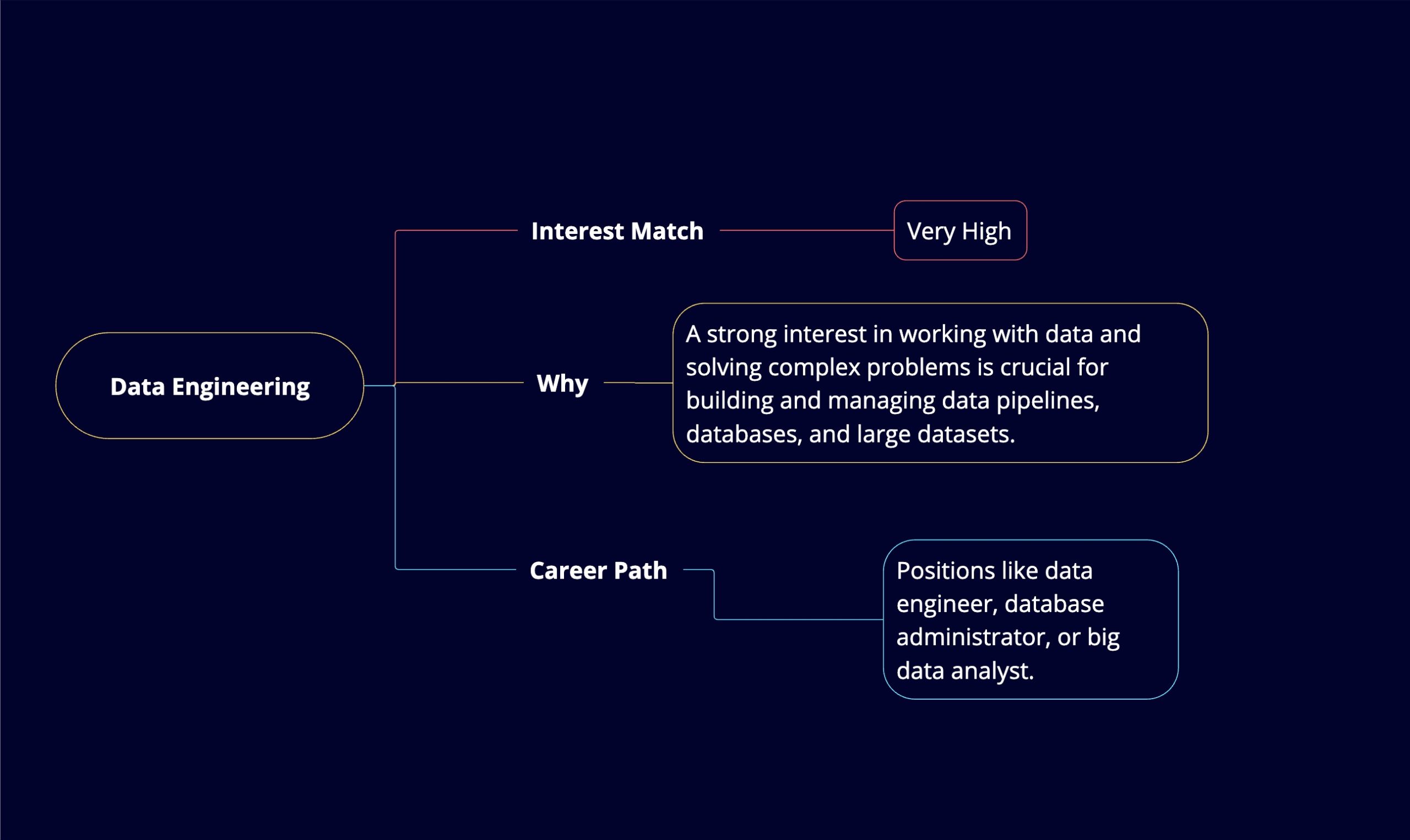
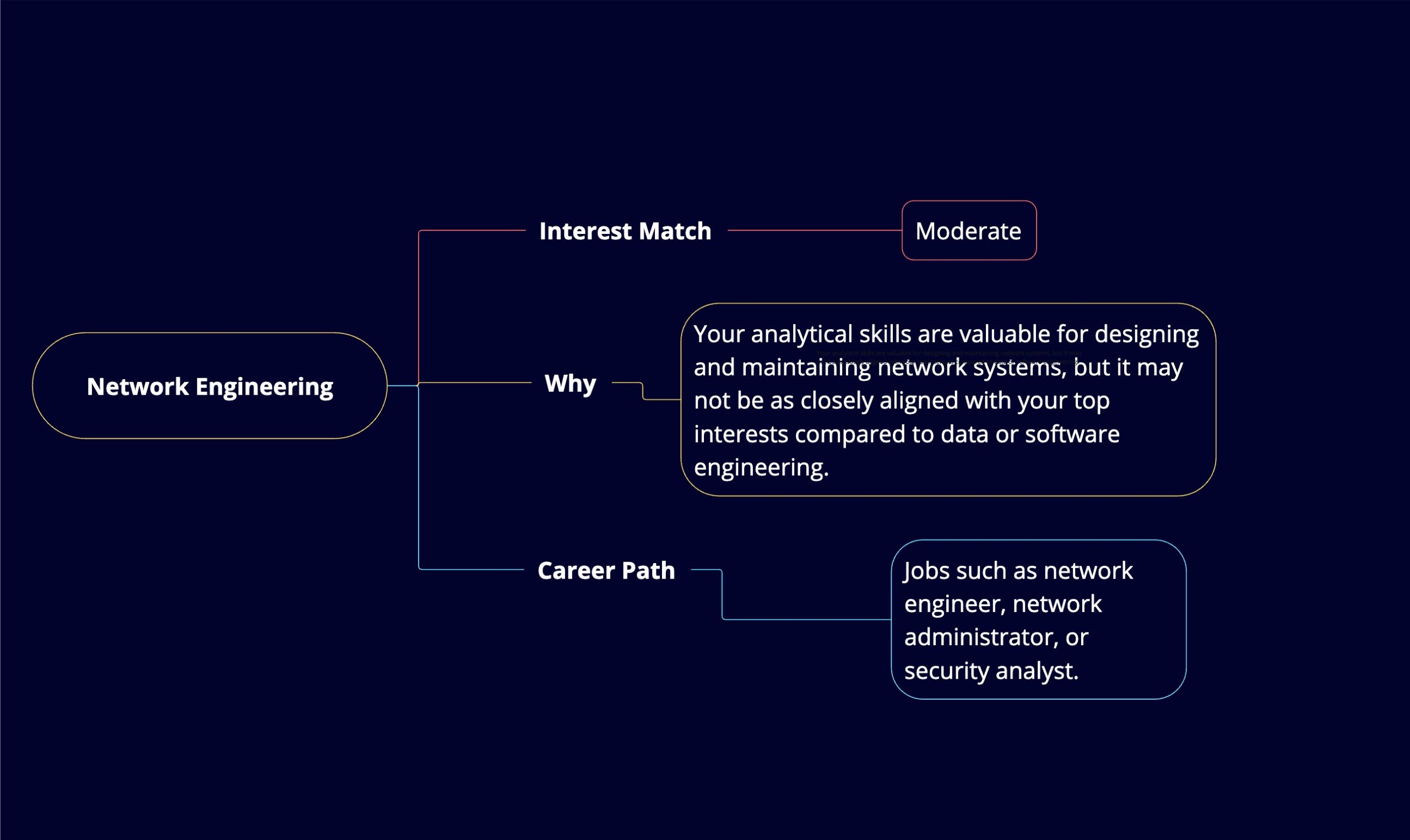
Skills Assessment Tests
Skills assessment tests are invaluable tools for anyone considering a career in tech engineering. These tests evaluate your current abilities in various technical domains, helping you understand where you excel and where you might need additional training. By pinpointing your strengths and weaknesses, you can tailor your learning journey to maximise your potential and address gaps in your knowledge.
Types of Skills Assessment Tests
-
- Coding Challenges and Competitions:
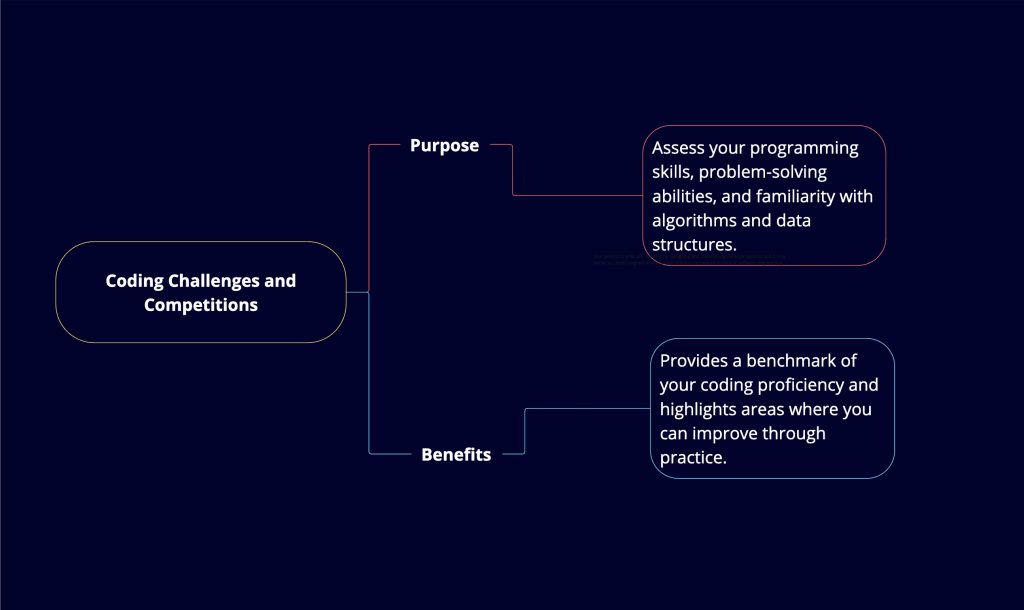
-
- Technical Skill Certifications:
- Platforms: Microsoft Certified, AWS Certified, Cisco Certified
- Technical Skill Certifications:
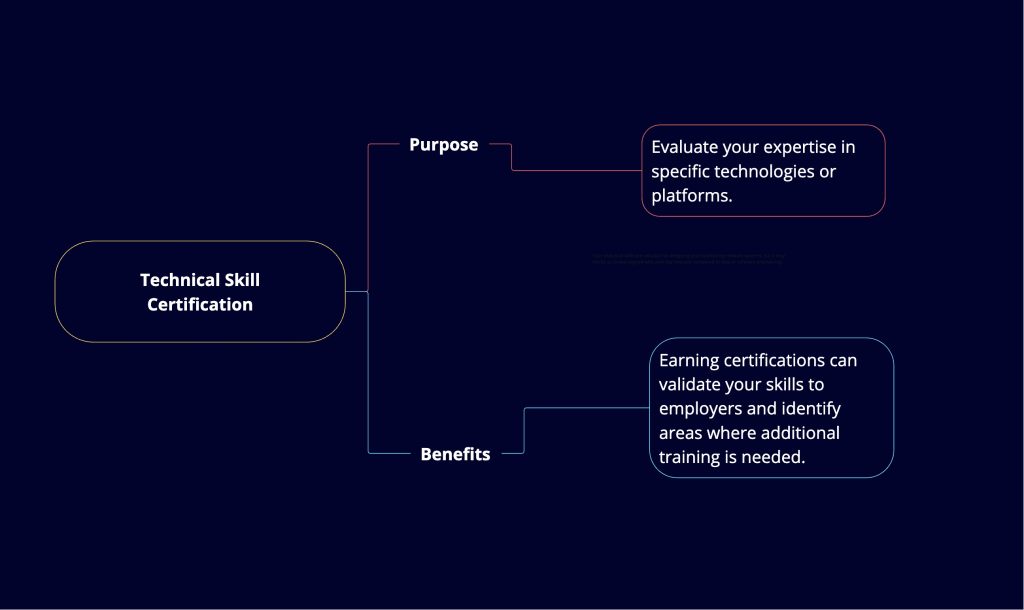
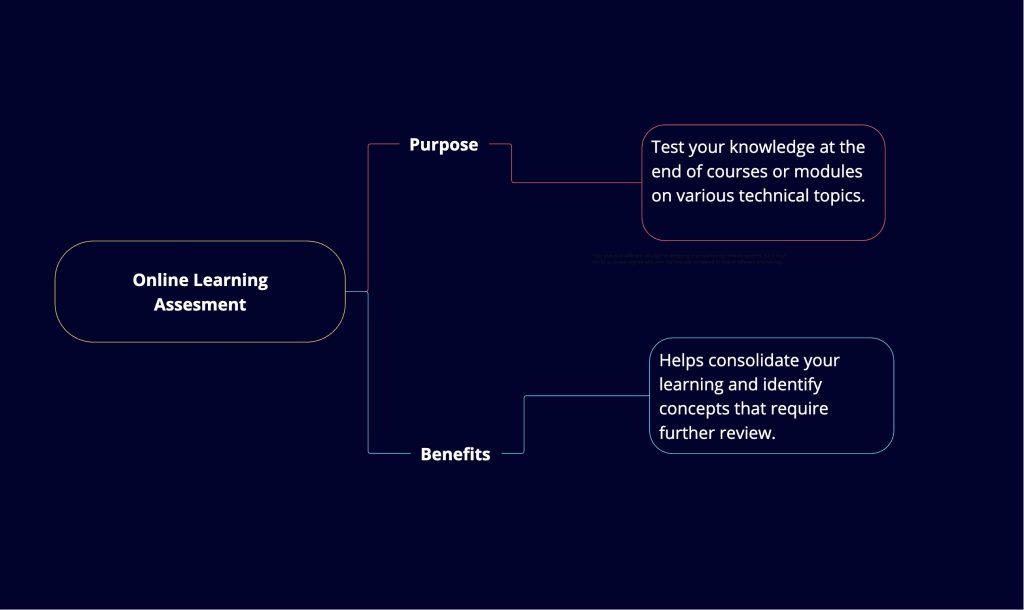
Researching Engineering Disciplines
The tech industry offers a wide range of engineering roles. Here’s a look at some popular engineering fields, along with their pros and cons:
Software Engineering
Software engineers design, develop, and maintain software systems. They work on everything from mobile apps to large-scale enterprise systems.
Pros:
- High demand for skills leading to numerous job opportunities.
- Potential for remote work and flexible hours.
- High salary potential.
Cons:
- Requires continuous learning to keep up with rapid technological advancements.
- Can involve long hours and tight deadlines.
Hardware Engineering
Hardware engineers design and develop physical components like processors, circuit boards, and memory devices.
Pros:
- Engaging work that combines creativity and technical skills.
- Opportunity to work on cutting-edge technology and innovation.
Cons:
- Often requires hands-on work, limiting remote opportunities.
- Can be more susceptible to industry fluctuations and supply chain issues.
Network Engineering
Network engineers design, implement, and manage computer networks, ensuring they run efficiently and securely.
Pros:
- Crucial role in maintaining organizational infrastructure.
- Strong demand in various industries, including IT, finance, and healthcare.
Cons:
- Requires in-depth knowledge of networking protocols and security measures.
- Can involve on-call work to address network issues.
Data Engineering
Data engineers build systems for collecting, storing, and analysing large datasets.
Pros:
- High demand due to the increasing importance of big data.
- Opportunity to work with advanced technologies like AI and machine learning.
Cons:
- Requires strong programming and database management skills.
- Can involve working with complex and unstructured data.
DevOps Engineering
DevOps engineers work at the intersection of software development and IT operations, focusing on continuous integration and delivery.
Pros:
- Enhances skills in both development and operations.
- High demand due to the shift towards agile and DevOps methodologies.
Cons:
- Requires broad knowledge across multiple domains.
- Can be stressful due to the need for rapid deployment and issue resolution
Education and Skill Development
Once you’ve identified the engineering discipline that aligns with your interests, the next step is to acquire the necessary education and skills.
Formal Education
- Degree Programs: A bachelor’s degree in computer science, electrical engineering, or a related field is typically required.
- Certifications: Industry certifications (e.g., AWS, Cisco, Microsoft) can enhance your credibility and job prospects.
Online Learning Platforms
- Coursera, Udacity, edX: Offer courses from top universities and industry leaders.
- CodeWorks, Codecademy: Provide accessible resources to learn programming and technical skills.
Practical Experience
- Internships: Gain hands-on experience and industry insights.
- Projects: Build a portfolio of projects to showcase your skills to potential employers.
- Hackathons: Participate in hackathons to solve real-world problems and network with industry professionals.
Networking and Mentorship
Building a professional network and finding mentors can significantly impact your career trajectory. Here’s how to start:
Networking
- Attend Industry Conferences: Engage with professionals and stay updated on industry trends.
- Join Professional Organisations: Participate in groups like The Chartered Institute for IT, IEEE, ACM, or local tech meet ups.
- Online Communities: Engage in forums, LinkedIn groups, and online courses with discussion features.
Mentorship
- Find a Mentor: Seek guidance from experienced professionals who can provide valuable career advice and support. Having been in your shoes, I would be delighted to offer advice and mentorship. Feel free to reach out to me through this blog or connect with me on LinkedIn.
- Be a Mentor: As you gain experience, mentoring others can enhance your leadership skills and expand your network.
Continuous Learning and Adaptation
The tech industry is dynamic, and staying relevant requires continuous learning and adaptation. Here are some tips to keep up:
- Stay Updated: Follow industry news, blogs, and podcasts.
- Learn New Skills: Regularly update your skillset with new technologies and methodologies.
- Seek Feedback: Continuously improve by seeking feedback from peers, mentors, and supervisors.
Embarking on a career in tech as an engineer is an exciting journey filled with opportunities for growth and innovation. Remember, a commitment to continuous learning and adaptability is the key to thriving in this ever-evolving industry. Good luck on your path to becoming a tech engineer, and remember, every long journey begins with a small step!




